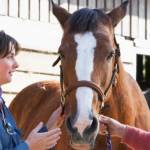Where Do Horse Owners Go for Nutrition Advice?

Whether it’s a pregnant broodmare, a two-year-old Thoroughbred in race training, a Grand Prix dressage star, or a gaited trail mount, every horse benefits from proper nutrition. Getting the right dietary components in the right amounts and proportions will help a horse stay healthy and perform to its maximum potential, while consuming an inadequate or unbalanced diet can lead to declining energy and musculoskeletal problems. However, horse owners looking for clear advice about how to feed their equines often run into suggestions that are unclear, confusing, and even contradictory. Where do these owners go for sound nutrition guidance, and which advisors are the most helpful? Australian researchers sought to answer these questions by conducting a study of feeding perceptions and practices among American horse owners. Findings include:
- Many owners underestimate their horses’ body weights and the amount the horses are being fed, while overestimating the amount of exercise their horses get.
- A number of high-level performance horses have health problems that can be related to feeding practices. These horses often get too much concentrated feed in a single meal and are given multiple nutritional supplements.
- Horse owners generally consider themselves to be well informed about equine nutrition, but they have gotten much of their information from equine magazines, feed store personnel, Internet websites, trainers, and other horse owners. While some of these sources might be well-informed and knowledgeable, it is difficult to judge the overall accuracy of this information.
- Most owners said that their veterinarians were their primary source of nutrition information, with equine nutritionists running a close second. While nearly every horse owner knows how to contact a veterinarian, nearly 4 of every 5 responding horse owners said they did not have access to an equine nutritionist, and some did not know these professionals existed.
- As a group, veterinarians reported a high level of confidence when giving nutritional advice related to colic, geriatric horses, laminitis, and obesity. Veterinarians in this group were not as confident when advising on nutrition for horses with less common conditions such as hyperkalemic periodic paralysis, developmental orthopedic disease, equine polysaccharide storage myopathy, and equine pituitary pars intermedia dysfunction (Cushing’s disease). Most of the responding veterinarians indicated there was not enough continuing education on nutrition topics, and many expressed the desire for more nutrition updates online.








